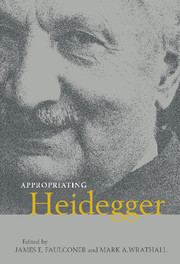Book contents
- Frontmatter
- Contents
- List of contributors
- Acknowledgments
- 1 Appropriating Heidegger
- PART 1 THINKING OUR AGE
- 2 Philosophy, thinkers, and Heidegger's place in the history of being
- 3 Night and day: Heidegger and Thoreau
- 4 Heidegger's alleged challenge to the Nazi concepts of race
- 5 Heidegger and ethics beyond the call of duty
- PART 2 HEIDEGGER IN CONTEXT
- PART 3 READING BEING AND TIME
- Index
2 - Philosophy, thinkers, and Heidegger's place in the history of being
Published online by Cambridge University Press: 22 September 2009
- Frontmatter
- Contents
- List of contributors
- Acknowledgments
- 1 Appropriating Heidegger
- PART 1 THINKING OUR AGE
- 2 Philosophy, thinkers, and Heidegger's place in the history of being
- 3 Night and day: Heidegger and Thoreau
- 4 Heidegger's alleged challenge to the Nazi concepts of race
- 5 Heidegger and ethics beyond the call of duty
- PART 2 HEIDEGGER IN CONTEXT
- PART 3 READING BEING AND TIME
- Index
Summary
THE END OF PHILOSOPHY
The response to Heidegger in the analytical world is, to a considerable degree, a paraphrase of Rudolf Carnap's 1932 essay “Überwindung der Metaphysik durch Logische Analyse der Sprache.” To the extent Heidegger intends to make philosophical claims with assertions like “the nothing nothings,” Carnap charges, his writings are utterly meaningless; to the extent that Heidegger is creating art, he does it poorly. Or, more likely, Heidegger's work, like that of all metaphysicians, confounds art and philosophy:
Metaphysicians are musicians without musical ability. Instead they have a strong inclination to work within the medium of the theoretical, to connect concepts and thoughts. Now, instead of activating, on the one hand, this inclination in the domain of science, and satisfying, on the other hand, the need for expression in art, the metaphysician confuses the two and produces a structure which achieves nothing for knowledge and something inadequate for the expression of attitude.
To respond to such charges with a defense of the meaningfulness of Heidegger's claims about “the nothing” would, however, miss the deeper point. Carnap's analysis of Heidegger's alleged “pseudo-sentences” is really ancillary to the project of rehabilitating philosophy as a discipline – a project driven by Carnap's view of language. For Carnap, assertions are meaningless unless they have empirical content. And if they have that, they belong properly to the empirical sciences.
- Type
- Chapter
- Information
- Appropriating Heidegger , pp. 9 - 29Publisher: Cambridge University PressPrint publication year: 2000



